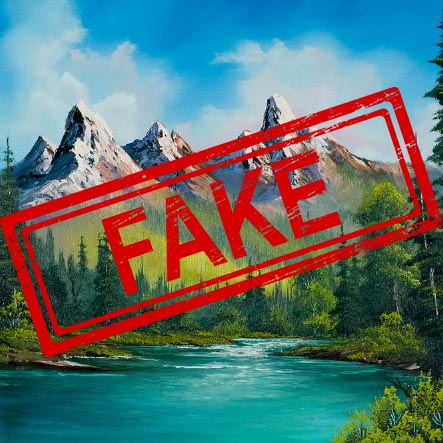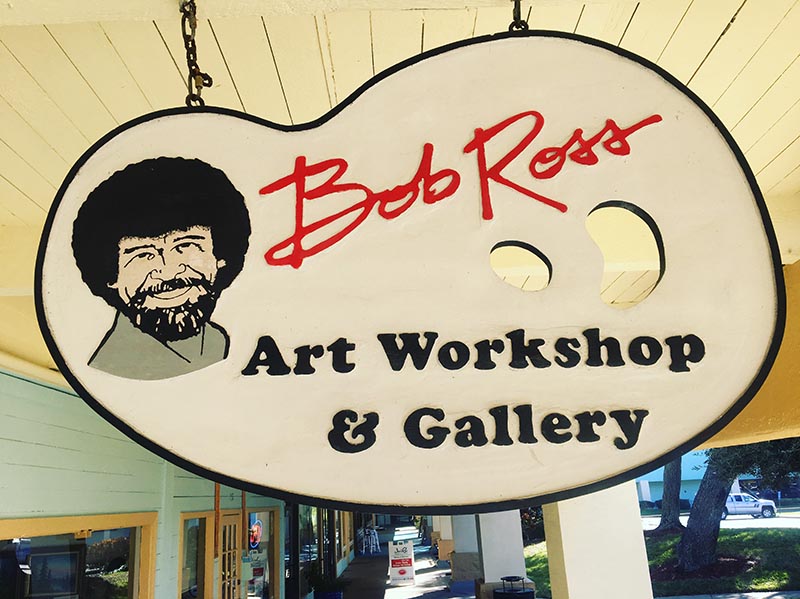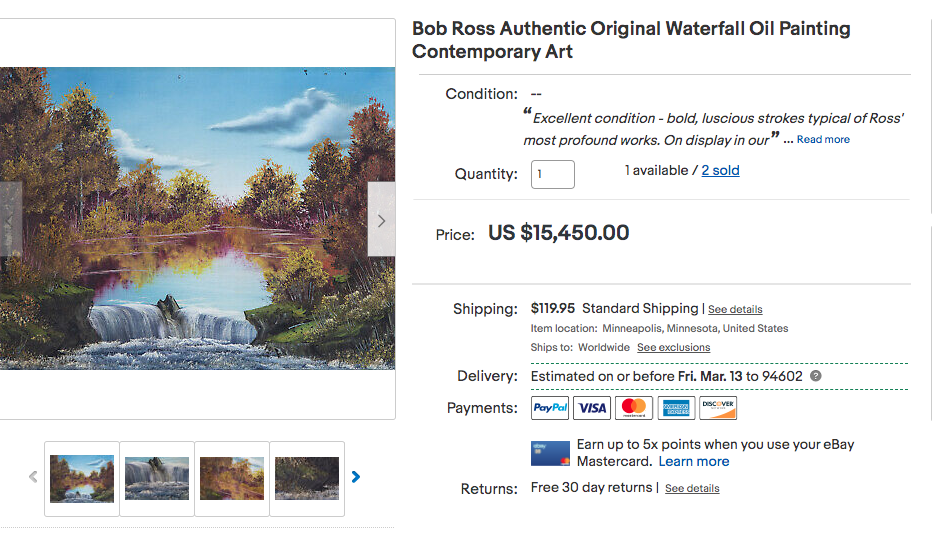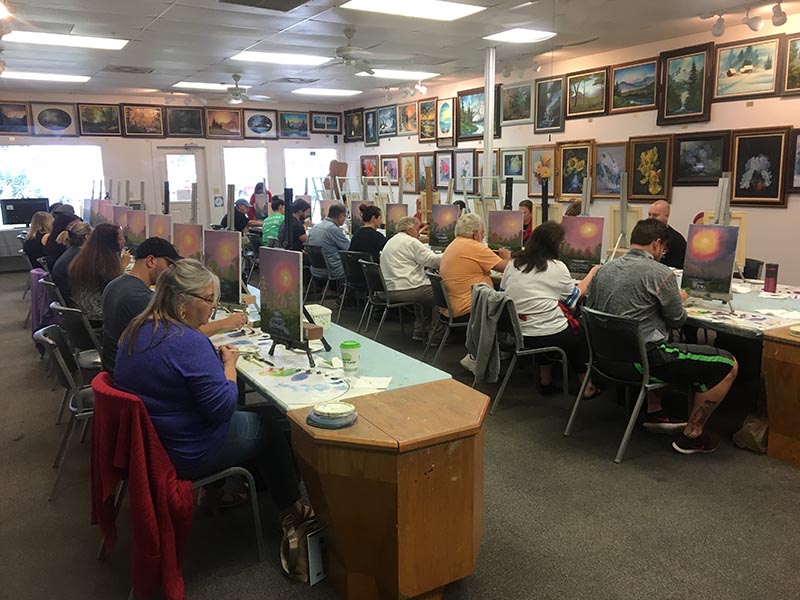In the market for a genuine piece of artwork by the iconic artist? Good luck. (You’ll need it.)

Bob Ross was a mythical unicorn. From his perfectly coiffed and permed hair to his gentle demeanor and ASMR voice, there was nobody else like him on TV for decades (except maybe Mister Rogers).
Soft-spoken and brimming with encouragement, Ross taught — and continues to teach — countless viewers how to paint “happy trees” and “little mountains” through his PBS program The Joy of Painting, which aired for 31 seasons and includes 403 episodes. Ross passed away in 1995 at the age of 52 from lymphoma, but you can still catch reruns of his show on public television or stream it online through Netflix, Twitch.tv, and YouTube.
What you won’t be able find, however, are his original paintings.
Like the man himself, Ross’ artworks are also mythical in stature.
Created using large brushes and his unique wet-on-wet painting technique, Ross’ works were never meant to be sold, and instead were merely instructional guides for the viewers of his show.
By his own estimate, Ross — who started creating art decades before The Joy of Painting launched — created more than 30,000 paintings in his lifetime. Only about 4 percent of them were created for The Joy of Painting, as Ross painted three copies of each artwork per episode.
So what happened to all of his ebony seas and lazy rivers? The best guess is that PBS stations have them hanging on their walls. Ross started that rumor himself, mentioning it in the final minutes of “Towering Glacier,” the fifth episode from season 11 of The Joy of Painting.
After demonstrating how to add large stones at the base of a waterfall, Ross said on-camera:
“One of the questions that I hear over and over is, ‘What do we do with all these paintings that we do on television?’ Most of these paintings are donated to PBS stations across the country. They auction them off and they make a happy buck with them. So if you’d like to have one of them, get in touch with your local PBS station. Because we do. We give them to stations all over the country to help them out in fundraisers.”
There have been many who have taken on the quest of hunting down an original Bob Ross painting only to end up empty-handed.
Molly Harris, a writer for the feminist online publication Rebellious Magazine, spent two months trying to track one down. She called PBS stations nationwide — “across the flyover states, the American Southwest, the impressive East Coast, the less-impressive West Coast, and f**king Alaska” — and not a single station fessed up to having a Bob Ross painting.
The closest Harris got to finding one was through the Bob Ross Art Workshop and Gallery in New Smyrna Beach, Florida.
Over the phone, the Workshop — which was opened by Ross himself in 1992 — confirmed that they owned originals of the artist’s work. You can also find this information on the homepage of their website. When Harris asked if she could buy one from them, the answer was, unsurprisingly, a resounding “no.”
OK Whatever contacted the Bob Ross Art Workshop via email and heard back from Nicholas Hankins, a certified Bob Ross instructor who manages the Florida Workshop.
He told us there are currently 54 original Bob Ross paintings on display in their gallery — 51 of which were “featured subjects” on The Joy of Painting.

Although Ross has been popular for decades, in recent years, Hankins has noticed “a tremendous increase in interest” from the public in both the artist and his work. Each month, the Workshop receives at least five phone calls and emails from people looking to buy an original Ross work.
Acquiring one is no easy task. This is largely because aside from the Bob Ross Art Workshop and the PBS stations that supposedly own them, most people who have an original Bob Ross painting in their possession simply don’t want to part with it.
This makes sense when you examine the kinds of people who own the artworks. Through research, OK Whatever learned that the majority of them knew Ross personally, took one of his courses, or acquired their painting through loose connections.
That’s how a woman named Diana Martin got her painting of a snowy mountainscape at sunset.
A former Baptist school employee who is now a vocal Trump supporter on Facebook, the Virginian grandmother acquired the 18” x 24” painting by attending a Bob Ross painting certification class in 1989. For reasons unknown, the artist gave Martin his finished work, writing on the back of the canvas in pencil, “To Diana, a very special friend. Happy painting. Bob Ross, 1989.” As if that weren’t enough to prove the painting was his, Ross also gave her a certificate of authenticity and posed for photos while working on the painting and, once it was done, with Martin and the finished work.
Another original Bob Ross painting was owned by a veteran in Albany, New York.
He purchased the already-framed painting of northern lights in the early 1980s while he was working for the U.S. Air Force in Fairbanks, Alaska. Before Ross became a television superstar, he, too, worked for the army in Alaska and it was there that he developed his wet-on-wet technique and taste for painting landscapes. Only later did the man learn that he’d been stationed at Eielson Air Force base at the same time as Ross; however, they never met because they worked in different units.

The man bought one of Ross’ paintings on a whim while out driving. He passed a house that had a bunch of paintings for sale in its front yard and decided to stop and check them out.
“I loved how he captured the essence of the aurora borealis in a painting, so I bought one,” the man later said. “It’s hung on my wall no matter where I lived ever since.”
Though his purchase didn’t come with a certificate of authentication like Martin’s had, the man was able to identify it as a Ross work from the signature, which was also marked “1981.” Ross also stamped both his name and address on the back of the painting’s frame.
There have also been those who haven’t even realized they own an original Bob Ross painting. That’s how a Reddit user named Brittany Tate acquired one for her birthday last year from her sister.
As she told it, her sister’s boyfriend’s grandmother had dated Ross “way back when.” When the grandmother passed away, her family discovered numerous paintings stored in a shed at her house.
When Tate’s sister learned of them, she asked if she go could go see them. Some of them “looked ruined” from time and poor conditions, but there were a few good ones in the stash, including a springtime mountain landscape with a small waterfall in the foreground. Tate’s sister chose that one to give to her as a gift and reportedly bought it from the family “for next to nothing.”

Most people aren’t as lucky as Tate when trying to get their hands on an original Bob Ross painting and have to shell out thousands upon thousands of dollars to get one.
Martin sold her Bob Ross painting on eBay last month and made $18,900. The Air Force veteran from New York got $12,633 (plus $46.60 for shipping) for his northern lights work when he sold it on eBay at the end of January.
And another original Bob Ross painting owner — who did not provide a background story on how they acquired their artwork — raked in $12,000 selling a woodsy landscape through eBay in March.
At any given time you’re bound to find so-called “original” Bob Ross paintings for sale on eBay and other online marketplaces. Most of them are, unsurprisingly, fakes or derivatives.
But as these recent sales prove, sometimes you can luck out and someone will post a listing for the real thing. Hankins, from the Bob Ross Art Workshop & Gallery, also backed up this claim, calling online auction sites “the only sources [he’s] ever seen offering an original oil painting by Bob Ross for purchase.”
Aside from making sure you thoroughly examine it to prove its authenticity, the takeaway seems to be that if you want a real Bob Ross, you’ll just have to wait. Both Martin and the veteran kept their original Bob Ross paintings in their possession for more than 20 years before deciding to part with them.
Timing is everything for a lot of things, but it appears to be especially so for those in the market for a work by Ross.
If you do see one for sale online and you’re unsure of its authenticity, send an email to the official “The Joy of Painting” With Bob Ross Facebook page, which shares its email address — [email protected] — with fans to prevent them from getting scammed.
Any article about original Bob Ross paintings wouldn’t be complete without noting the irony of shelling out the big bucks to buy one of his paintings. Yes, Ross was a talented and skilled artist, but that wasn’t the point. His whole schtick was teaching others how to recreate his imagery, reinforcing in them the confidence to pick up a brush and try painting for themselves. He encouraged people to make art, not spend countless hours and dollars trying to buy his art.
So to anyone looking to buy an original painting of his, think twice before you click “Buy Now” or “Make Offer” because you can probably recreate one yourself.
As Ross would say, “All you need to do is just practice a little.”
